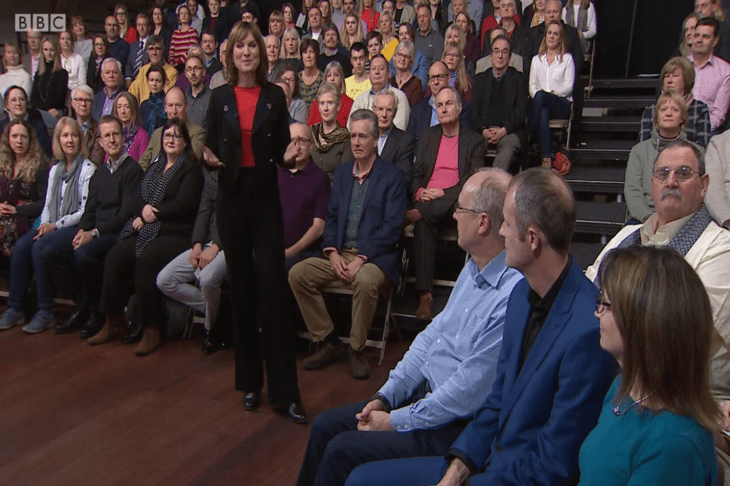Earthquakes in public opinion do not happen often, and when they do they can catch commentators unawares. But if you want to see one in motion you should go back and watch the last two editions of Question Time. Until recently, the BBC show could be relied upon to have a loud contingent of groaning audience members capable of drowning out the ‘gammon’ tendency. The programme even managed to find a broadly pro-Remain audience in Clacton, the one and only seat which Ukip ever managed to win at a general election.
But no longer. The arrival of Fiona Bruce has coincided with a sharp change in audience tone. When, last week, there were cheers for Isabel Oakeshott when she opposed any kind of delay to Brexit, I put it down to the programme coming from Derby, a working class industrial town which voted 57 per cent in favour of Leave in 2016. But then last night came Winchester, which in 2016 voted 59 per cent in favour of Remain. And yet there, too, the audience showed impatience with anyone who showed sympathy with the idea of delaying Brexit.
There is now a very firm sentiment which has taken hold in every part of Britain, at every socio-economic level: it is ‘just get on with it’. Calls for a second referendum are fading fast, as is the belief in extending negotiations. People can see that the EU has not the slightest intention of ceding ground on the backstop or anything else. What is the point in stretching out the business any further?
So why are those who demanded a second referendum – who seemed so perky just a few weeks ago – suddenly losing ground? I think there is a very good reason. The tragedy of some Remainers – the fatal flaw in their tactics – is that so few of them have been able to say a bad word about the EU. It doesn’t matter how inflexible, how stubborn the EU has been, how determined it has shown itself to punish Britain, these people just haven’t seemed to have it in them to raise the faintest criticism.
This week a quote from Michel Barnier came to light which sums up what has been obvious for many months. Barnier allegedly said some time ago: “I’ll have done my job if the exit terms are so bad that the British would rather stay”. That is a pretty hostile attitude to take in negotiations which were supposed to be taking place between friends and neighbours. But where were the Lord Adonis’, Alistair Campbells, Nick Cleggs, Michael Heseltines, Tony Blairs, Ken Clarkes to condemn him? Nowhere to be seen. Yvette Cooper couldn’t even seem to criticise Barnier this week when he scorned her attempt to get the Commons to vote to rule out ‘no deal’. If she expected help from him, she got just the usual brush-off.
To those Remainers who have never accepted the result of the referendum (Ken Clarke might be allowed a partial exception to this), the EU has been beyond reproach. They have taken its side every time, cheered every bad word it has said about Theresa May and her team. Take these extraordinary words in a tweet from Alastair Campbell in November 2017 when the negotiations over the Irish backstop first came to a head: “play hardball Leo”. That was a former aide to the prime minister of the United Kingdom imploring the head of a foreign state to hold out for the worst-possible deal for Britain.
The attitude has been akin to that of Jeremy Corbyn, who has spent a 35 year political career almost automatically taking the side of Sinn Fein, Hamas and anyone else who is trying to fight UK interests. They will of course dispute it and say they are only trying to assert that Britain’s interests lie within the EU, but the message that comes across is simply that they want the EU to win and Britain to lose.
The hardest Brexiteers have not shied away from criticising our own government in its ham-fisted efforts to negotiate a decent deal, prepare for no-deal and so on. How much better those Remainers would have come across had they displayed a slightly more even-handed approach and been prepared to acknowledge the stubbornness and unreasonableness of the EU side. Instead, they just cheered and cheered it on.
The public has had enough. If we are going to have a messy divorce in which we are forced to take sides, the winners in the battle for UK public opinion are inevitably going to be those who take our own side.







Comments